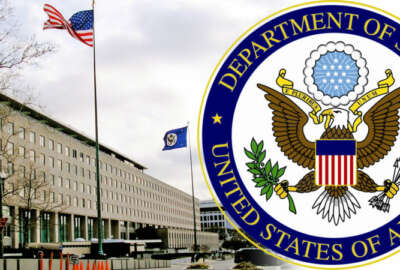
State Department fellowship seeks to bridge diversity gap amid cyber talent
Agencies face an uphill battle competing with the private sector to recruit top cyber talent right out of college or advanced degree programs, but the State...
Best listening experience is on Chrome, Firefox or Safari. Subscribe to Federal Drive’s daily audio interviews on Apple Podcasts or PodcastOne.
Agencies face an uphill battle competing with the private sector to recruit top cyber talent right out of college or advanced degree programs. But the State Department, and the opportunity to explore new cultures, serves as an enticing lure to recent graduates.
The State Department launched the Foreign Affairs Information Technology (FAIT) Fellowship as a pilot program in 2017. This fall, the agency will receive applications for its third class of fellows.
Karen Ritter, the State Department’s program manager for the FAIT Fellowship, said her team looks at a variety of factors when they read through the applications, including financial need and geographic, ethnic and gender diversity.
“It was really borne out of trying to meet the challenges of bringing in information management specialists, and bringing in a diverse cadre,” Ritter said.
Agency data shows that by the end of fiscal 2017, about 71 percent of State employees were white, compared to 15 percent African American, 6 percent Asian and 4.5 percent multirace. Meanwhile, more than 15,000 cyber positions across the government still need to be filled.
In addition, recent data from the Partnership for Public Service shows employees age 30 or younger only make up 6 percent of the federal workforce.
The application, available through The Washington Center, a nonprofit organization that connects college and graduate students to professional development programs, goes live in October, and closes around late December or early January.
In April, the State Department will bring the top 10 candidates to Washington, D.C. That’s when Ritter said the finalists go through one last round of screening.
“It’s very competitive,” she said. “They have to do an essay very similar to the Foreign Service specialist oral assessment — kind of a truncated version of that.”
An intersection of technology and diplomacy
The five finalists — three graduate students and two undergraduates — come back to D.C. in June. That’s when they’ll intern at the State Department’s headquarters in Foggy Bottom, and will partner with an agency mentor.
Through professional development sessions, the fellows hear from members of the Foreign Service with decades of experience.
Akvile Kiskis, a graduate fellow completing her master’s degree in forensics and cybersecurity at the Illinois Institute of Technology, said the FAIT Fellowship has given her the flexibility to explore the intersection of diplomacy and technology.
“If I show interest in a particular area, I can just reach out and they’ll get me in touch with someone. I have the opportunity to learn more about those things, or get a project related to that, which I don’t think is typical for a normal internship,” Kiskis said.
Kiskis said she applied to the FAIT fellowship because the State Department’s mission appealed to her.
“In the Foreign Service, everyone is very mission-focused, and when I speak with people that have actually worked there, they say it’s not like a job, it’s almost like its own community, like a second family,” she said. “Everyone is working toward the same goal, and you get to meet a lot of people you wouldn’t otherwise meet.”
Next summer, following their D.C. internships, the fellows will get their first taste of the Foreign Service with an internship at an overseas post.
Michael Moise, one of the undergraduate fellows, and a student at Syracuse University, said one of the deciding factors for him applying to the fellowship was trying to unravel some of the mystique of the State Department.
“Sometimes, as a young person, you don’t really understand what the government does and what role they play in today’s society,” Moise said. “For the Foreign Service, in particular, I think it’s a great opportunity to represent America.”
But Moise had some tough choices to make before taking the State Department fellowship. He had to turn down a summer internship at Bank of America as a result.
“After I weighed all the options, I decided to go with this, because it was just a good experience. I would get to be in D.C. I would get to be overseas and have a career for five years,” Moise said. “That was a big perk for me, getting to travel and see the world.”
Shaki Kar, one of the graduate fellows completing his master’s degree in cybersecurity at Pace University works with the State Department’s Office of Innovative Infrastructure.
“Basically, what we do is the cloud computing capabilities. I’m working on teams to pretty much implement these capabilities at the State Department,” Kar said. “What makes it interesting is it makes the job easier for the customers, which are the foreign service officers and the civil service. Cloud computing makes things easier by quicker communication and real-time collaboration.”
Envisioning a State Department career
For other finalists, the FAIT fellowship serves as another milestone in a career path already aligned towards the Foreign Service.
For nearly the past five years, Rachel Chao, a graduate fellow and a student at George Washington University, has lived overseas. Her husband works in the Foreign Service as a specialist. She found out about the FAIT fellowship while working in the IT department of the U.S. embassy in Tbilisi, Georgia.
Latest Workforce News
“I was in near-daily contact with my D.C. counterparts, but I had never met them before,” Chao said. “This domestic internship has been giving me a much-needed perspective. It’s putting a face to these people that I’ve been working with on a professional level for a couple of years.”
Before applying for the FAIT fellowship, Brady DeMeritt, an undergraduate fellow studying linguistics and computer science at Pomona College, had earned a scholarship through the State Department’s National Security Language Initiative for Youth.
Through that program, he took a gap year between high school and college to travel to South Korea and learn the language. While studying abroad, DeMeritt got to visit the U.S. embassy and meet with other students.
“I met some of the Fulbright fellows that were stationed in Korea at the time, and other things like that really opened my eyes to all the different things the Department of State does,” he said.
Copyright © 2025 Federal News Network. All rights reserved. This website is not intended for users located within the European Economic Area.
Jory Heckman is a reporter at Federal News Network covering U.S. Postal Service, IRS, big data and technology issues.
Follow @jheckmanWFED
Related Stories




